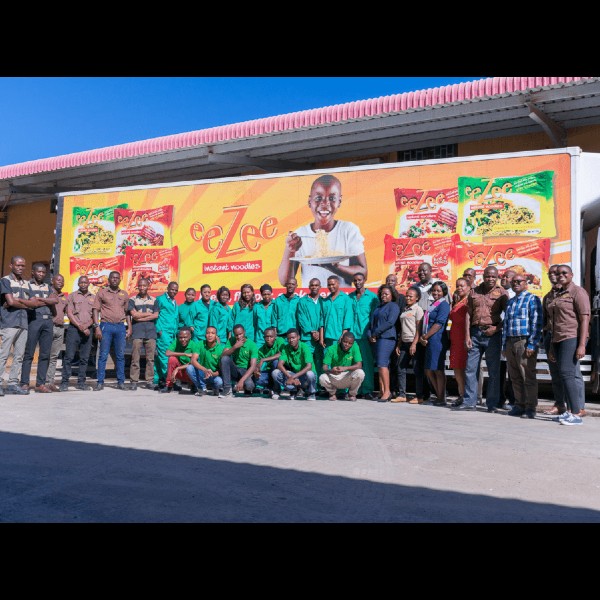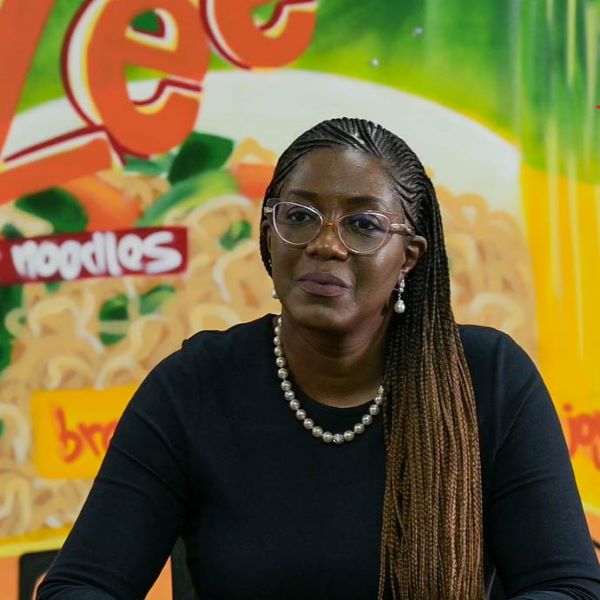One of the easiest meals to prepare when pressed for time is noodles.
In Zambia, eeZee instant noodles are a popular delicacy among kids and adults alike but particularly among students and young people.
EeZee noodles are produced by Java Foods Limited, a Zambian food processing company that produces instant pasta, cereal, and seasonings.
This dominating noodle company was started by Monica Musonda, a reputable corporate lawyer who found her way into the world of entrepreneurship after being influenced by Africa’s richest man, Aliko Dangote.
Contents
Aliko Dangote’s impact on Monica’s journey
During a trip she took with Dangote to Zambia, the billionaire was concerned about Zambia’s economy being controlled by foreigners, from banks to insurance, to manufacturing.
This observation, coupled with seeing how Nigerians have control over their own economy, was like a light-bulb moment for Monica and she decided to do her bit to change the status quo in Zambia.
Her subsequent engagements with her homeland were spent exploring potential business ideas in Zambia’s manufacturing sector.
In 2011, while visiting her parents in Zambia, Monica noticed that supermarket shelves had very few locally manufactured food products, despite the country being one of the biggest food producers in Southern Africa.
To change the narrative of Zambians not being active participants, but rather spectators in their own economy, Monica resigned from her prestigious role at Dangote Group to start Java Foods Limited.
Who is Monica Musonda?
Monica Katebe Musonda was born in Zambia in 1976.
She holds a Bachelor of Laws degree from the University of Zambia and a Master of Laws degree from the University of London, qualifying both as an English solicitor and a Zambian advocate.
She started her legal career working at the Attorney General’s office in Zambia before becoming an associate attorney at Clifford Chance in London.
She later moved to Edward Nathan Law Firm in Johannesburg, South Africa rising to Partner status before relocating to Washington DC where, for two years, she served as part of the in-house counsel team at the International Finance Corporation (IFC).
Her first encounter with Aliko Dangote was in Washington DC, while working at the IFC but she would later take up an opportunity to work closely with him, in Lagos, Nigeria first as the Director of Legal and Corporate Affairs and shortly after as the General Counsel of the Dangote Group.
As General Counsel of Dangote Group, Monica was part of the team that worked on the 2010 $13 billion listing of Dangote Cement on the Nigerian Stock Exchange and the Group’s 2011 $400 million investment in Zambia to build the country’s largest integrated cement plant.
Recalling his days working with Aliko Dangote, Monica had this to say;
“Working with a visionary is always hard work. He never stopped working, which meant we never stopped working. On the flip side, he emphasized the importance of maintaining humility and focus, being driven and working hard, and not being afraid to take calculated risks.”
Monica Musonda
The environment at Dangote Group expanded Monica’s perspective on how local manufacturing industries can create thousands, if not millions of jobs, directly impacting African economies positively.
In 2012, Monica left her lucrative position at Dangote Group to venture into Zambia’s food manufacturing space, to not only promote Zambia’s economic growth but also provide affordable, nutritious food options to Zambians.
Zambia, being a productive agricultural country, with surplus wheat and maize outputs, had the untapped potential to supply raw materials to its processed food manufacturing sector.
As a corporate person with limited direct entrepreneurial experience, Monica knew quitting her job was a risk.
In a past interview, she observed that establishing Java Foods Limited was like starting a new life. However, she knew she had a safety net, and would go back to the corporate world if things failed to work out.
After all, who wouldn’t want to hire someone with such an illustrious legal career?
Monica is today one of Zambia’s foremost entrepreneurs and has served on various high-profile boards including; Central Bank of Zambia, Dangote Industries Zambia Limited, Airtel Networks Zambia Plc, Zambia Breweries, Partners in Food Solutions, Kwacha Pension Trust Fund, Zambia Sugar Plc, Zambeef Plc, African Life Assurance (subsidiary of Sanlam) and Microsoft4Afrika Advisory Council.
Previously she has been; Young Global Leader (World Economic Forum, 2013) and Archbishop Desmond Tutu Leadership Fellow.
She’s also been awarded the African Agribusiness Entrepreneur of the Year (2017) and the Amadeus Institute’s MEDays Forum ‘Champion of the South’ (2016)
The Growth and Development of Java Foods Limited
When Monica was looking for a name for her company, she wanted the name to be something easy to relate to.
Java is inspired by Java Island in Indonesia, a country that is the world’s second-largest producer of instant noodles, after China.
Java was launched in 2012 in Zambia with a vision of manufacturing nutritious food products using locally sourced raw materials at affordable price points.
In 2012, Monica invested her finances plus monies she raised from family and friends into Java Foods, introducing and marketing the eeZee Instant Noodles brand into the Zambian market while still outsourcing production to a manufacturer in China.
In 2015, Java Foods introduced its second product, eeZee Supa Cereal which was also being manufactured at a leased facility in China.
Over time, Java Foods would set up facilities to localize some parts of the manufacturing process.
The tremendous growth of the two products in the Zambian market coupled with Monica’s desire to operate a full-fledged manufacturing facility that utilizes Zambian cereals prompted her to seek out strategic investors.
In 2018, Monica sold 49% of the company to two equity partners; DSM Venture Partners and Adolf H. Lundin Charitable Foundation securing the necessary financial, governance, and networking muscle to take the company to the next level.
With further technical and financial support from the Alliance for Inclusive and Nutrition Food Processing (AINFP) Java Foods was able to establish an ultra-mordern processing facility in Zambia.
AINFP is a partnership between USAID, TechnoServe, and Partners in Food Solutions.


2019 through 2021 saw a graduated relocation of Java Foods manufacturing facilities to Zambia.
Today, 80% of raw materials used in the production of Java Foods products are sourced locally, a development that has seen a reduction in costs and better-quality noodles and cereals.
Java Foods Limited has grown to be Zambia’s premium manufacturer of three popular products; the eeZee Instant Noodles, a fortified porridge brand, eeZee Supa Cereal, and a spice range of Maharaja curry powders and eeZee beef or chicken seasoning/stew powders.
The eeZee Supa Cereal is a porridge made out of varying blends of local grains such as maize, sorghum, or soya with its Corn Soy Blend popularly used by government and non-governmental organizations in school feeding programs & emergency relief programs.
Java Foods Limited currently employs over 80 people with its eeZee Instant Noodles being consumed in Zambia, Malawi, and Zimbabwe where it is distributed by Tulips Distribution Limited.
In 2023, Monica signed a $6.5 million investment agreement with the South Lusaka Industrial Free Zone Commission (LSMFEZ) to set up a new manufacturing facility on 4.76 hectares of land, positioning Java Foods Limited to (upon completion) serve local, regional, and international markets.
Her advice to aspiring women entrepreneurs is to procrastinate less and just start;
“It will be hard, not all pieces will be in place, but believe in yourself and your passion and just START! I think we find in Africa that women carry so many things, they have so many great ideas, but often are afraid of starting. The point is that you are not going to build a factory on day one, but you can start small with what you can manage – the idea is to just start.”
Monica Musonda
Challenges Monica faced while building Java Foods
Java Foods’ journey to becoming one of Zambia’s biggest FMCG brands has weathered tremendous storms to get a seat at the table of Zambia’s biggest manufacturers.
Monica admits that access to affordable finance remains a major issue, whenever there is a need for expansion just as it was when Java Foods was starting.
Zambia’s commercial banks do not have favorable products for SMEs and the options they present charge crazy and prohibitive interest rates of 26-35%.
The other challenge Monica faced was that the Zambian retail market was mainly dominated by South African retailers such as Pick ‘n Pay and Shoprite who only believed in stocking South African and foreign products.
As a female Zambian entrepreneur, Monica had to fight her way onto the shelves of these retail giants;
“I have a legal background and I am used to bullying my way through. At times you could not even get to the door of a South African retailer. They questioned who you were, and whether you could deliver because Zambians ‘don’t deliver’. We persisted, went back again and again, and used every bit of ammunition we had – we used every network we had. If you have a product that answers a need and you’re consistent with the right price, they can’t avoid you”
Monica Musonda
After navigating the retailers’ enlisting huddles, came their expensive system of doing business. The South African retailers did not have a central hub that accepted supplier deliveries.
A supplier had to deliver their products to all the retailers’ stores across the country while bearing the transport costs which could sometimes be higher than the product cost.
Human capital was another key challenge. Capacity and the spirit of ‘applying oneself’ was hard to find in many employees.
A lack of a good market understanding was the other challenge that made Monica almost quit, early on.
Monica observes that in retrospect, they would have started with producing the porridge brand, which had a better market reception than the Noodles.
Indeed, back in 2012, Zambians were largely used to nshima (the Zambian staple made from maize) with noodles seen as an expatriate’s diet.
The entrepreneur mindset in Monica however knew that it was just a matter of time, having worked in Nigeria whose youth were already Africa’s largest consumers of instant noodles.
For the first three years, the company was bleeding money since the market had yet to embrace noodles.
The noodle market soon caught on buoyed by affordability, the convenience of the 3-minute cook time, and the influence of international trends on social media.
Zambia’s majority young population, millennials, and gen-zees, especially those in colleges, quickly swapped the pricier alternatives of instant foods such as bread and chips/chicken for noodles and eggs.






